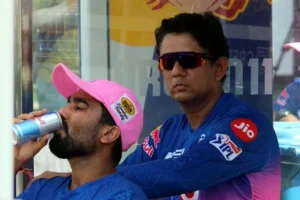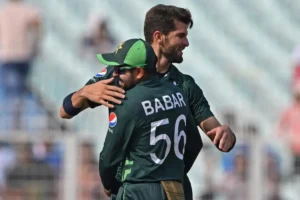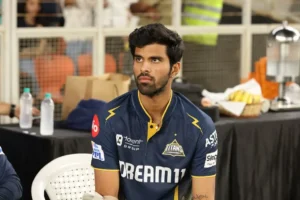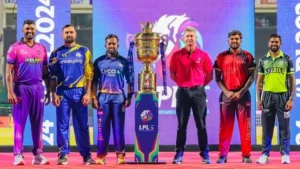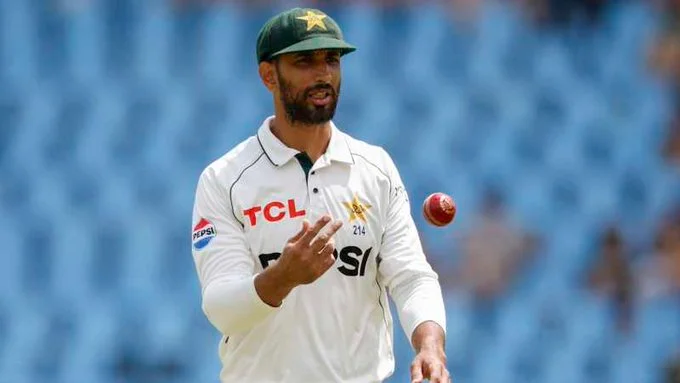In a move that’s as bold as it is unconventional, the Pakistan Cricket Board ![]() (PCB) has appointed Shan Masood, the nation’s current Test captain, as its Consultant for International Cricket and Players’ Affairs.
(PCB) has appointed Shan Masood, the nation’s current Test captain, as its Consultant for International Cricket and Players’ Affairs.
The announcement, made by PCB Chairman Mohsin Naqvi during a high-profile dinner at the Prime Minister’s residence in Islamabad, underscores a fresh administrative strategy aimed at blending on-field expertise with off-field governance.
At 36, Masood finds himself juggling leadership duties on the pitch and strategic oversight behind the scenes
—a rare hybrid role that could redefine how Pakistan approaches its international cricket commitments.
The Backdrop: A Shuffled Deck in PCB’s Leadership
The decision comes amid ongoing turbulence in the PCB’s upper echelons.
Just weeks ago, the board advertised the position of Director of International Cricket Operations, with applications closing on November 2.
This followed the suspension—and subsequent reinstatement and reassignment—of Usman Wahla,
who had held the role since May 2023 after Zakir Khan’s contract expired.
Wahla’s exit was triggered by controversy surrounding the “Handshakegate” incident during the Asia Cup league match between India and Pakistan in Dubai last month,
where allegations of mishandling post-match protocols surfaced.
PCB sources indicate that internal discussions quickly coalesced around Masood as the ideal candidate.
“There was a clear consensus that Shan is the best man to lead the international cricket affairs department,”
one insider revealed.
Misbah-ul-Haq, a former captain and coaching stalwart, was reportedly a frontrunner for the role,
but Masood’s active involvement in the national setup tipped the scales.
His appointment signals the PCB’s pivot toward integrating current players into administrative frameworks,
fostering a seamless bridge between the dressing room and decision-making table.
Shan Masood Evolving Journey: From Opener to Overseer
Shan Masood’s cricketing odyssey reads like a tale of persistence and promise. Born into a family with deep cricket ties
—his father serves on the PCB’s Board of Governors—Masood has carved his path through grit rather than privilege.
Debuting for Pakistan in 2013 against South Africa, the left-handed opener has amassed 44 Tests, nine ODIs, and 19 T20Is.
His Test record boasts an average of around 30, punctuated by gritty knocks like his debut 75 in Durban and a century against Sri Lanka in 2015 that helped chase down 377.
Appointed Test captain in November 2023 following Babar Azam’s resignation from white-ball leadership,
Masood inherited a red-ball side grappling with inconsistency.
Under his watch, Pakistan has navigated the World Test Championship (WTC) cycle with mixed results, including a recent confirmation of his captaincy extension through the 2025-27 edition.
His tactical acumen, honed by stints in English county cricket with Yorkshire, Derbyshire, and Hampshire, has earned praise for its composure amid pressure.
Yet, challenges persist: Pakistan’s Test schedule remains sparse, and the team has struggled abroad.
Now, as Consultant, Masood’s remit expands dramatically.
The role encompasses preparing for ICC cricket committees, crafting logistics and budgets for Future Tours Programme (FTP) engagements, negotiating bilateral series, executing player contracts, and planning itineraries across formats.
He’ll also advocate for players’ affairs, ensuring their voices shape policy. Crucially, Masood retains his captaincy for the ongoing WTC cycle, a dual mandate that invites both excitement and scrutiny.
Implications for Pakistan Cricket: A High-Stakes Experiment
This appointment arrives at a pivotal juncture for Pakistan cricket.
The national team faces a demanding slate, including home Tests against England and South Africa, and away challenges in Australia and New Zealand.
With the WTC final looming as a distant but tantalizing goal, Masood’s administrative perch could streamline preparations—imagine a captain directly influencing tour logistics or contract incentives.
It echoes global precedents, like India’s Ravi Shastri doubling as coach and commentator, but Masood’s active-playing status marks uncharted territory.
Critics, however, question the wisdom of overloading a serving captain. “Strange are the ways of Pak cricket,” quipped one observer on social media, highlighting the potential for divided focus.
On Social Media, reactions ranged from celebratory—”An active player taking up an administrative role, that’s probably a first”—to satirical jabs about interim captaincy shifts.
Supporters counter that Masood’s elevation aligns with the PCB’s vision under Naqvi, who has emphasized cricketer-led reforms since assuming chairmanship.
Broader ripples could extend to bilateral ties and ICC dynamics.
Masood’s negotiation savvy might bolster Pakistan’s push for equitable FTP slots, especially amid ongoing disputes with India over hosting rights.
Domestically, it reinforces the PCB’s policy of upgrading captains’ central contracts—Masood ascended to Category B upon his 2023 appointment—while signaling trust in homegrown talent over external hires.
Looking Ahead: Shan Masood Balancing Act
As the dust settles on this seismic shift, all eyes turn to Masood’s first major test in his new guise.
With Pakistan’s next assignment—a three-Test series against Bangladesh in early 2026—on the horizon, he’ll need to synchronize captaincy calls with operational blueprints.
Success here could cement his legacy as a transformative figure, much like Inzamam-ul-Haq’s post-playing influence. Failure risks amplifying the PCB’s reputation for volatility.
For now, Shan Masood stands at cricket’s crossroads: bat in one hand, blueprint in the other. In a format that rewards endurance, his real innings has just begun.
Whether this gamble yields runs or exposes frailties remains the game’s great unknown—but if anyone can open the door to a new era, it’s the man who’s spent a career knocking on it.
Also Read : David Miller and Gerald Coetzee Ruled Out from Pakistan Tour



